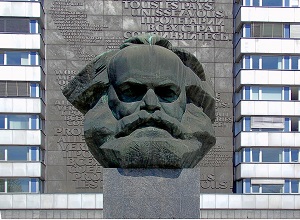 Karl Marx and his famous co-author Friedrich Engels are mostly known for their quite provocative Communist Manifesto that they begin with a famous statement that the “whole history is based exceptionally on the class struggle.” The two philosophers argue that the range of changes that occur in various political institutions, in the society levels, as well as in history itself, are typically driven by the collective struggle on the part of individuals, who live in the same economic environment in order to realize both economic and material interests. Starting from the ancient Rome and till the present day, these struggles have been an essential part of live, the authors insist. The following aspects are an integral part of Marx teachings; however, there are far more important features of Marxism, if you dig deeper into the philosophy.
Karl Marx and his famous co-author Friedrich Engels are mostly known for their quite provocative Communist Manifesto that they begin with a famous statement that the “whole history is based exceptionally on the class struggle.” The two philosophers argue that the range of changes that occur in various political institutions, in the society levels, as well as in history itself, are typically driven by the collective struggle on the part of individuals, who live in the same economic environment in order to realize both economic and material interests. Starting from the ancient Rome and till the present day, these struggles have been an essential part of live, the authors insist. The following aspects are an integral part of Marx teachings; however, there are far more important features of Marxism, if you dig deeper into the philosophy.
In Marx works, history is represented as the history of class struggles among all the society classes. The new progressive classes tend to appear here and there and are related to new production forms. They always start struggling with the old ones. Once the new classes successfully win the desired power, the new society forms appear suitable to the new forms of production. That’s the historical materialism doctrine.
According to the philosopher, the stages of human history take in the so-called primitive communism that typically includes equalitarian principles of gathering and hunting; the barbarism era, when the chiefs are ruling the world; the slave society when the slave class exist and feudalism, agriculture, communism, socialism and capitalism.
According to Karl Marx teachings, when it comes to capitalism, the capitalists are the owners of the production means, while the proletariat are the owners of their own work capacity. Landlords in turn make sure to rule the land, while the workers are more significant than the peasants. The latter happen to be trapped in the world called “the rural life idiocy”. The proletariat group is definitely comprised of those, who are engaged in the objects hand-made production. However, Marxists tend to dither about whether this group includes individuals, who are employees, but live by their wages and work only with their minds.
As stated by Marx, the only way new classes can go to win its power is by revolution. The revolution is a quite violent method since the ruling class usually never gives up power without a bloody struggle. Here’s what Karl Marx says about the revolution: it is impossible for the socialism to come into existence without the revolutionary events. In order to make sure the socialism will be finally born, the old order should die. In accordance with Marx, this process requires the complete overthrow of the ruling power that exists at the moment. That’s what the philosopher defines as the revolution.
References:
- Marx, K., Engels, F., (1975–) Gesamtausgabe (MEGA), Berlin: D
ietz.
- J. S. Mill, On the Principles of Political Economy, London, 1848, Vol. II, pp. 17-30.
- Cohen, G.A., (1978) Karl Marx’s Theory of History: a Defence, Oxford: Oxford University Press.
- Marx, K. and Engels, F. The Holy Family, or Critique of Critical Criticism. Against Bruno Bauer and Company (this volume).
- G. D. H. Cole, History of Socialist Thought, Volume I, The For€runners 1789-1850 (New York, 1953).
- Loyd D. Easton and Kurt H. Guddat. Writings of the Young Marx on Philosophy and Society, trans. and ed.
- Karl Marx, The Poverty of Philosophy: A Reply to M. Proudhon’s Philosophy of Poverty, New York, International Publishers, n.d., pages 94-5.